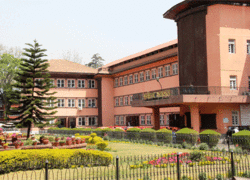Supreme Court of Nepal
| The Supreme Court of Nepal | |
|---|---|
| सर्वोच्च अदालत | |

Supreme Court Building
|
|
| Established | 21 May 1956 |
| Country |
|
| Location | Ram Shah Path, Kathmandu, Nepal |
| Coordinates | 27°41′49″N 85°19′19″E / 27.697°N 85.322°ECoordinates: 27°41′49″N 85°19′19″E / 27.697°N 85.322°E |
| Composition method | Presidential nomination with parliament confirmation |
| Authorized by | Constitution of Nepal |
| Decisions are appealed to | Presidential for clemency/commutation of sentence |
| Judge term length | 65 years of age |
| No. of positions | 1 Chief Justice + 20 permanent judges |
| Website | supremecourt.gov.np |
| Chief Justice | |
| Currently | Sushila Karki |
| Since | 2016 |
The Supreme Court of Nepal (Nepali: सर्वोच्च अदालत) is the highest court in Nepal. It has ultimate appellate jurisdiction over all Appellate and District court. The court consists of twenty Justices and one Chief Justice.
The Supreme Court is composed of the Chief Justice, twenty Justices. The Chief Justice is appointed by President on the recommendation of the Constitutional Council. He/She is appointed from among the justices having minimum three years of experience of the Supreme Court. Justices of the Supreme Court are appointed by Chief Justice of Nepal on the recommendation of the Judicial Council. The Registrar and other officers of the Court are appointed by Government of Nepal under the recommendation of the Judicial Service Commission.
Justices of the Supreme Court are appointed from among the judges who have worked for seven years as the judges of the Court of Appeal, or Gazetted first class officer of Judicial Service for minimum 12 years or have worked as any Senior Advocate or Advocate with minimum practicing experience of fifteen years, or a distinguished jurist who has worked for minimum 15 years in the judicial or legal field.
Justices of the Supreme Court hold their office till the age of sixty-five. They may be removed through an Impeach (motion) passed by a two third majority of the House of Representatives on the ground of incompetence or bad moral conduct or dishonesty. The Chief Justice may resign from office at any time by submitting resignation to the council of ministers and other justices may resign from their office by submitting their resignation to the Chief Justice.
...
Wikipedia
